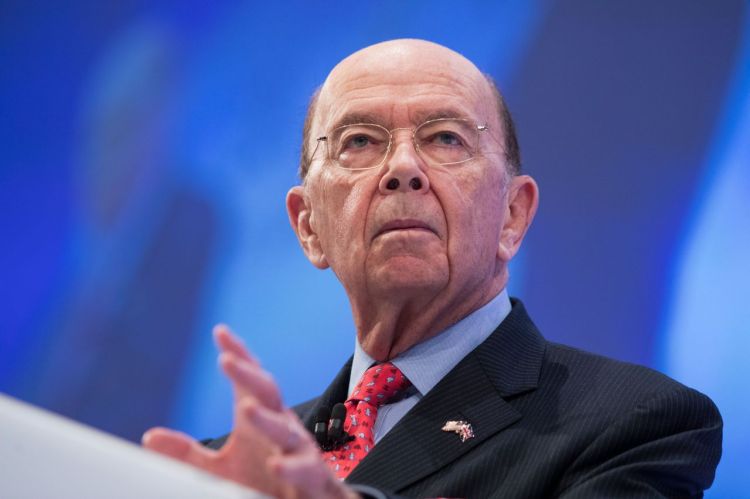Forbes magazine says that Commerce Secretary Wilbur Ross “lied to us” about his net worth, exaggerating it by billions of dollars to make the widely cited “Forbes 400″ list of richest people in America. Ross was dropped from the list for 2017 after being a presence for 13 years.
In an article Dan Alexander posted Tuesday, Forbes said it discovered a discrepancy after examining Ross’s government financial disclosure forms, on which Ross, a Wall Street investor before President Trump put him in his Cabinet, listed his assets at $700 million.
That’s not even close to qualifying for what the magazine calls “the country’s most exclusive club” in which the richest person, Bill Gates, is worth $89 billion and the poorest a mere $2 billion.
Nor was it close to what Ross had told the magazine he was worth in 2016, about $3.7 billion or to what he told Forbes recently, that his net worth was about $2.7 billion.
When Forbes asked Ross about the wide gap between the worth he claims and the assets on his government disclosure forms, he said he that he had put “more than $2 billion” into trusts for his family just between the election and his nomination as commerce secretary that did not have to be disclosed in the federal filings. Added to the $700 million, that would place his worth at about $2.7 billion. He insisted to Forbes that he still qualified for the rich list.
But he declined to provide documentation of the $2 billion transfer of money into trusts, citing “privacy issues,” Forbes said.
Forbes reported that it consulted ethics and tax experts who raised questions about Ross’s assertion.
“If Ross had owned $2 billion of additional assets before the election,” the article said, “wouldn’t they have produced income that he was required to disclose, even if he no longer owned the assets? And why would someone apparently transfer $2 billion to his family, thereby triggering more than $800 million in gift taxes, especially with a president in the White House who was prepared to eliminate the estate tax and therefore much of the cost of transferring fortunes to later generations?”
On top of that, the Commerce Department later contradicted Ross’s claim about the transfer of $2 billion. After Forbes first raised questions about Ross’s claimed wealth in an Oct. 16 article, the department, Forbes reported, issued a statement saying that “Contrary to the report in Forbes, there was no major asset transfer to a trust in the period between the election and Secretary Ross’s confirmation.”
In Tuesday’s article, Forbes said that “after one month of digging” Forbes is “confident” that the $2 billion “never existed. It seems clear that Ross lied to us, the latest in an apparent sequence of fibs, exaggerations, omissions, fabrications and whoppers that have been going on with Forbes since 2004.” The article went on to claim that Ross has been exaggerating his wealth for years, starting in 2004, when he led Forbes, as it was compiling its rich list, to believe he was worth “four times as much” as he was.
It also acknowledged that “Forbes continued to largely fall for it.”
No spokesman for Ross could be reached for comment overnight by The Washington Post. But in a statement to Forbes, the Commerce Department said: “Secretary Ross has filed all required disclosures in accordance with the law and in consultation with both legal counsel and ethics officials at the Department of Commerce and Office of Government ethics. As we have said before, any misunderstanding from your previous conversation with Secretary Ross is unfortunate.”
A spokesman for the department gave a similar statement to the Financial Times and CNBC.
The story offered an unusual glimpse into the process by which Forbes compiles its rich lists. In Ross’s case, there’s been a lot of haggling, the article said.
Forbes, it turns out, had been arguing with Ross about his assets in 2016. In that year, Forbes had ranked Ross at number 232 with a net worth of $2.9 billion. Ross “claimed the number was far too low,” Forbes reported. “he maintained he was closer to $3.7 billion,” a figure Forbes would not accept.
Forbes claims Ross has a history of exaggerating his wealth in part to bolster his ability to attract clients and investors.
It quoted Sam Green, who put $300 million on behalf of the Oregon Public Employees Retirement Fund in a Ross investment fund, saying that Ross used claims about his personal wealth to enhance confidence in his businesses and attract investors.
But “Ross’ appointment as secretary of commerce came with one catch: He had to disclose his assets, providing evidence that he was not as rich as he had long claimed.”
The Forbes story comes as other questions are being raised about the dealings of the once high-flying investor. A trove of leaked documents, known as the “Paradise Papers,” showed that he has interests in shipping company called Navigator Holdings that did business with an energy firm partially owned by the son-in-law of Russian President Vladimir Putin.
Send questions/comments to the editors.



Success. Please wait for the page to reload. If the page does not reload within 5 seconds, please refresh the page.
Enter your email and password to access comments.
Hi, to comment on stories you must . This profile is in addition to your subscription and website login.
Already have a commenting profile? .
Invalid username/password.
Please check your email to confirm and complete your registration.
Only subscribers are eligible to post comments. Please subscribe or login first for digital access. Here’s why.
Use the form below to reset your password. When you've submitted your account email, we will send an email with a reset code.